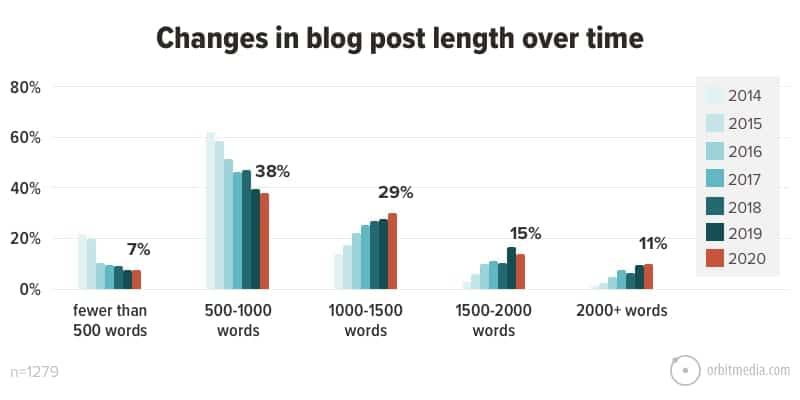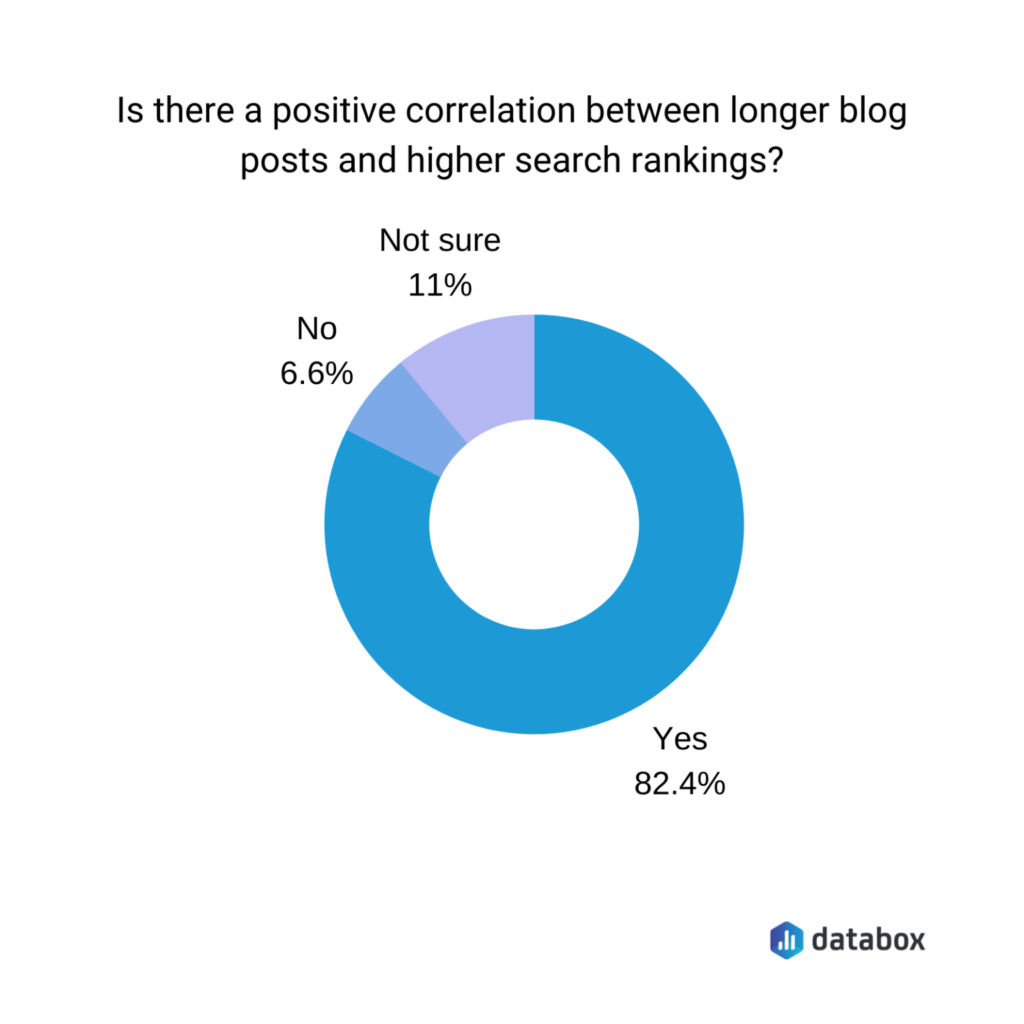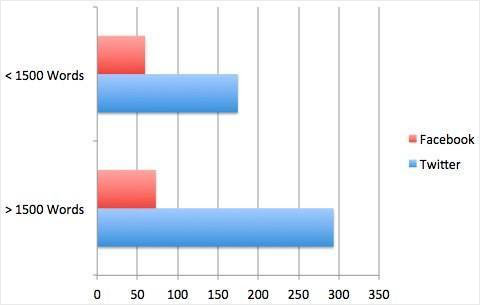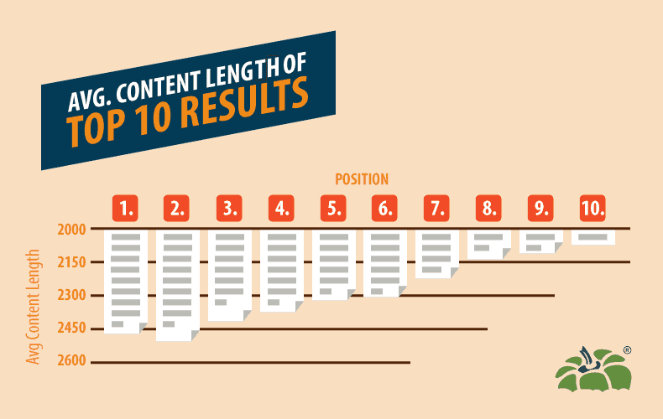The Long and Short of It: What’s the Ideal Blog Post Length?

Table of Contents
- Long or short? Your guide to the ideal blog post length
- How to Determine the Ideal Length of a Blog Post?
- Differing Blog Post Lengths
- How to Beat Competition?
- How Long Should a Blog Post be
- FAQs
Blogs are a very important form of content marketing. According to statistics, as many as 20 billion pages of this long-form content type are viewed by approximately 409 million people each year. However, creating that perfect blog has always kept content writers on their toes. One of the crucial factors that can make or break a blog is the blog post length. How long or short must a blog be to engage readers? Before we seek an answer to this all-important question, let’s look at some points.
How to Determine the Ideal Blog Post Length?
The ideal blog post length is probably the most discussed topic recently. Will people read long blogs or opt for shorter ones? As a blogger, you need to consider that the content is more important than the blog post length. The word count by itself cannot be a factor in achieving a good ranking.
However, statistics say that word count is equally important, if not more, in spite of the fact that a blog post needs to have thoroughly researched content to make it informative. A few years back, the average blog post length hovered between 500 and 800 words, or maybe shorter. Of course, people like Seth Godin can afford to write 200-word blogs that go crazily viral; however, that is more an exception than a benchmark. Unless you’ve been in hibernation like the Polar bear, you’d be aware that the best blog post length today is between 2000 and 2500 words. In other words, real long-form content is highly preferred and ranked over shorter blogs.
More readers means a higher blogs post length
With the US alone having over 31.7 million bloggers (Statista), tons of content is written and read daily. Research indicates that the ideal blog post length is above 2000 words and averages at 2300 words. The primary reason for this ideal blog length being popular is the topic it covers in detail, which is impossible to achieve in a short blog post. Although a long-form blog denotes quality content, it has to be scannable (short paragraphs) to make it more readable as no one reads winding content.
The trick lies in not just having short sentences and paragraphs but also having catchy headers and sub-titles. Breaking up the content helps you cover all the points in the topic yet make it readable. Remember, no one reads a long-form blog entirely. Having bullet points and sub-titles makes it easier to scan the content and read the essential parts. This the only way you can justify the blog post length and make long form blogs more readable and interactive.
Differing Blog Post Lengths
So, how long should a blog post be? The ideal word count for a blog post is a hotly debated topic. Most new bloggers are pretty unsure when it comes to deciding what should be the length of an effective blog post. Also, what should be the minimum blog post length for SEO?
However, besides the length, the quality of the content matters a lot and needs to be the main focus. Attention spans are getting shorter by the day (lack of time), and it is logical to think that short blog posts will do better. The answer is a big NO. The blog post length is directly proportional to the interest it generates, provided the topic is exciting and informative.
Today’s blogs are longer
Recent research by Orbit Media indicates an increase of 42% in a blog post length more recently, and the norm of 800 words to a blog post has increased to around 1150 words or more. A Buffer post also indicates that the ideal blog length is slightly more at 1,600 words. However, an article on Medium gives the ideal blog length as a read time (seven minutes) instead of a word count.
With native English speakers reading at 300 words per minute, a 7-minute blog should feature approximately 2000+ words, which probably gives the best answer to the question, ‘how long should a blog post be’? However, most long-form blogs are 2200 to 2500 words long, which may be the ideal limit.
The rhyme and reason behind long-form content
If the content is king, long-form content is an emperor. The ideal word count for a blog post length is 2000+ words. And although it takes quite a while to write a lengthy blog, it has its merits. Besides adding value to your readers, it is loaded with information, all available at one convenient place. A long, informative blog has the readers spending more time on the website, which is its primary endeavor. And if they like what they read, they’ll probably share it with friends on social media.

How to Beat the Competition?
As a long-form type of content, blogs, too, have severe competitors. The old-world print and publishing enterprises and the audio-visual (AV) mediums like television and YouTube are the chief (and formidable) competitors for bloggers. To stand out from the crowd, you need to keep the following points in mind:
- A good blog has to have a good title. It should grab the readers’ eyeballs.
- The structure and style of your blog must be consistent.
- The topic at hand should be concisely discussed.
- One should achieve granularity and specialty over some time.
- The blogging spaces should be wisely chosen, especially concerning hosting services.
- One should have a flair for precise writing.
- If one is dealing with special topics such as business and finance, law, medicine, and engineering, one should be consistent with providing industry updates.
- Do your keyword research well.
Also, remember that organic content is the best content – in other words, content that is based on experience and observation of the writer/blogger himself or herself.
A lot of information is readily available for use at the click of a button. Reading relevant sites would help you gain enough material for your blog. However, while doing this, you should not lose focus on your reader’s expectations and the keywords that must be targeted.
How Long Should a Blog Post be
There are 488 million blogs on Tumblr, 77 million on WordPress, and 2 million on Jumla, Wix, etc., as per Tech Jury. Some sites put the median word length of blogs at 1200 words to attract maximum traffic. In other words, the ideal blog length is seen to be ranging between 1200 and 1500 words (explanation below).
Let’s see why these sites are coming up with such numbers.
1. Survey data
Orbit Media Studio surveyed 1000+ bloggers. The primary data shows that every year the blog post length is going up by 500 words.
It was observed that the bloggers who wrote longer posts were getting better results. It was also noted that there was a strong association between longer blog posts and better rankings and more shares and likes, as shown in the following pie chart.

2. Quantity matters or quality?
That is a million-dollar question. Though it is well-proven and accepted that longer posts rank better in search engine results, the quality of a blog post cannot be compromised. Blogs should be concise, clear and comprehensive, and should give some value to readers. If readers are getting what they are searching for in your blogs (be it of any length), they will stay engaged. Sometimes readers require quick tips though, in this case, short blogs of less than 500 words are more useful. If your blog is about a complex topic, it can go beyond 3000 words as well, according to some experts.
3. The target audience
You should know your audience. You can structure your blog and decide on your tone accordingly. Avoid jargon and difficult technical lingo; your blogs should be readable for all. Most blogs with pictorial representations have a higher recall potential. Offer statistics, but don’t make your posts too number-heavy.
4. Better search results
Long posts require readers to stay on your page for a longer time. The longer they stay on your web page, the more likely they are to check out more content, products, or services on your site. As the customer engagement on a blog increases, the likelihood of converting them into buyers and loyal customers also increases. These customers would be more likely to subscribe to your site. They may share the content as well. Longer posts get more shares and likes on social media sites like Twitter and Facebook, says this report.

The use of relevant keywords is also key to the success of longer posts that show a better ranking on the first-page landscape.

However, these are just numbers, and when it comes to blogs, nothing is set in stone. Different industries and subjects require different blog post lengths. Depending on how articulate you or your content writer is, the length of your blog could be different. Your topic needs to decide your ideal blog post length. Let it come naturally, and then take it from there.

Key Takeaways
- Blog posts are the most read type of long-form content on the internet today. With millions of blogs going live every day, making your blog stand out is all about a delicate dance of quality and quantity.
- While the quality of your blog entirely depends on the writer, the number of words in your blog is today directly proportional to the rankings as far as data is concerned.
- After looking at many statistics, it can be established that blogs with over 2000 words find higher readership and engagement these days.
- The main reason why such long blogs are doing well is detailed information on the topic. It serves as a one-stop-shop on a certain topic and prevents readers from searching for multiple blogs on the same subject but for information on sub-topics.
- These blogs also have more scope of mentioning keywords in a better quantity which in turn helps on higher rankings and thus readership.
FAQs
As suggested by experts, the ideal blog post length should not exceed 2000 words, and preferably, not below 1500 words. However, the focus is not on quantity but quality. But any blog with 1000 words or more is preferable as it gets ranked better, provided it features the relevant keywords.
The ideal read time for a blog post is between six to seven minutes, which means an average blog post length is between 1800 to 2100 words. People don’t wish to spend too much time reading text, and most of them may skip blog posts that exceed 7 minutes unless it is a ‘how to’ blog post or a do-it-yourself (DIF) blog with specific steps described in detail.
Firstly, congrats on your maiden venture! Your first blog post presents an excellent opportunity to introduce yourself briefly, after which you can dwell on what the blog is about and what prompted you to become a blogger. The trick lies in writing a brief and interesting introductory paragraph and short paragraphs that add up to an ideal blog length.
It depends on how interesting your blog post is; however, the minimum ideal article length is 300 words if you want it to be ranked comfortably in the search engines. However, longer blog posts rank better, so try to increase the length without losing the essence and the readers’ interest.
From the SEO perspective, the ideal word count for a blog post is between 2200 and 2500. Through 2019 and 2020, the most-read blog posts featured an average word count of 2300 words. It is advisable to determine the purpose and have a well-defined target audience to make your SEO blog post for 2021 effective. It should also be well structured and have the standard internal and external links.
Latest Blogs
Learn how to rank on AI search engines like ChatGPT, Perplexity, and Gemini by optimizing your content for authority, structure, and relevance. Stay ahead in AI-driven search with this strategic guide.
Explore the best healthcare SEO services for your medical practice. Improve online visibility and effectively reach more patients in need of your services.
Discover top social media agencies specializing in banking solutions, enhancing financial services and driving engagement.
Get your hands on the latest news!
Similar Posts

Artificial Intelligence
5 mins read
Top AI Blog Writing Tools for Website Monetization

Blogging
10 mins read
How to Start a Successful Food Blog in 2022

Blogging
4 mins read